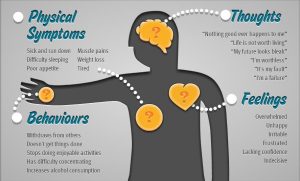Depression symptoms in a person aren’t always obvious. Sometimes depression symptoms are overlooked as part of other medical conditions. Other times depression symptoms are missed because the person hides the pain. Here are 5 depression symptoms you shouldn’t ignore.
1. Trouble sleeping.
Sleep is a big problem for someone depressed. Negative thoughts about self keeps a person awake at night. The person can’t help but ruminate on these thoughts. Mindfulness doesn’t really work at night because the subconscious comes out to play, and logical thoughts take a snooze. This said, a result of not sleeping at night is sleeping for long periods during the day. So if you notice someone sleeping lots during the day and not getting any sleep at night, it may be a sign of depression.
2. Loss of interest in favourite activities.
Some people turn to hobbies to cheer up. But a depressed person avoids activities that once used to be pleasurable. A man may not realize he’s depressed, or if he does he won’t admit to it. He will give excuses for losing interest in his favourite activity. He’ll say he’s tired, overworked, or busy. That way he won’t be called weak or wimp because he doesn’t want to join in on the fun. Don’t push him to get back into the activity. That only aggravates the situation and the real reason – depression – takes a back seat to anger.
3. Increase in energy.
On the flip side of depression is manic energy. This happens when a person has bipolar depression. Manic energy is the desire to do everything at once and the thinking that you are invincible. Why not book a sudden trip to Thailand, even if it means you’ll be broke? That sudden, extravagant, flamboyant behaviour is short. It is followed by a sudden drop back into depression.
An increase in energy may also signal a person who has made the decision to attempt suicide. The person feels relief in having come to a resolution. So if you notice a drastic change in energy, you should be concerned.
4. Change in appetite.
A depressed person has a sudden change in appetite. The person may stop eating because he or she is no longer concerned with physical well being. Not eating may also be related to fatigue and lack of pleasure from activities. Food looses its comfort, because flavour and texture don’t stimulate the brain like they did. This makes sense that if you’re upset, your body is affected.
A depressed person craves sugars and carbohydrates. Carbohydrate and sugar craving is related to decreases in the feel-good hormone serotonin, which is marked by a decline in mood and concentration. Eating these foods is a way of self medicating depression.
5. Going to the dark side.
A severely depressed person starts thinking about death, to the point of thinking about suicide. The person starts talking about “after I’m gone” and “what if I wasn’t around.” Other times the person opts for risky behaviour via sex, food, or addiction. The person may start drinking, gambling, be sexually unsatisfied, overindulge in eating, or exhibit risky behaviour like driving too fast, etc.
The person contemplating suicide may not tell anyone or may confide in one person. If the person confides in you that he or she is thinking about suicide, don’t promise to keep it a secret. Let the person know you are going to tell someone who can help. Offer to take the person to a medical professional who can help.
To deal with these 5 depression symptoms, reach out and get help from a medical professional. Don’t try to deal alone with the situation. You can, however, do a few things. Assess the severity. If the person seems to be an immediate threat to his or her self, contact your local emergency or a mental health crisis centre. Create a safe environment. If the person is suicidal, remove any potentially lethal items from the environment. Be kind. Don’t start blaming the person for being depressed. That only closes any possible conversation. Ignore the stigma. Look at and treat the person as you always did.
* Click here to find out about Terezia Farkas and Depression Help
Join the conversation. Leave a comment. Ask a question


